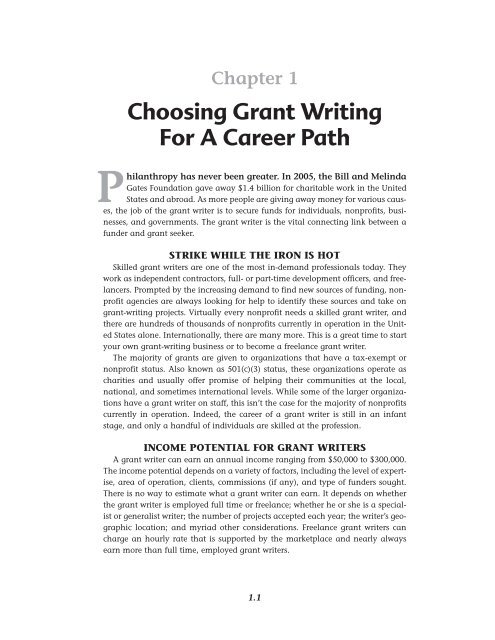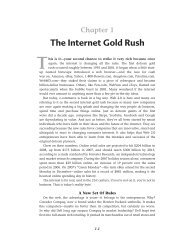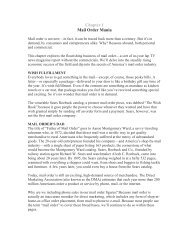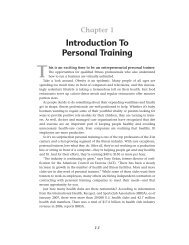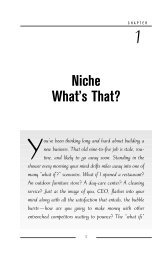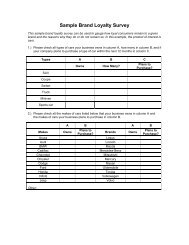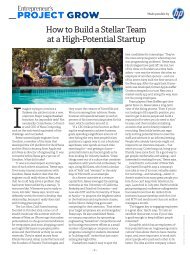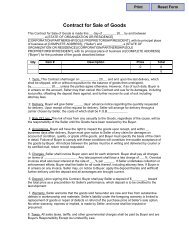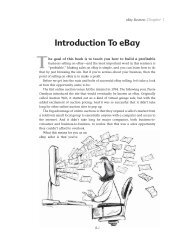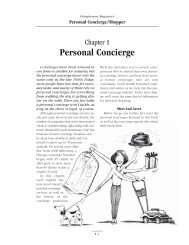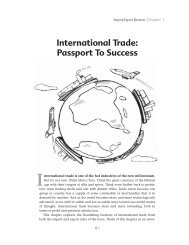Choosing Grant Writing For A Career Path
Choosing Grant Writing For A Career Path
Choosing Grant Writing For A Career Path
You also want an ePaper? Increase the reach of your titles
YUMPU automatically turns print PDFs into web optimized ePapers that Google loves.
Chapter 1<br />
<strong>Choosing</strong> <strong>Grant</strong> <strong>Writing</strong><br />
<strong>For</strong> A <strong>Career</strong> <strong>Path</strong><br />
Philanthropy has never been greater. In 2005, the Bill and Melinda<br />
Gates Foundation gave away $1.4 billion for charitable work in the United<br />
States and abroad. As more people are giving away money for various causes,<br />
the job of the grant writer is to secure funds for individuals, nonprofits, businesses,<br />
and governments. The grant writer is the vital connecting link between a<br />
funder and grant seeker.<br />
STRIKE WHILE THE IRON IS HOT<br />
Skilled grant writers are one of the most in-demand professionals today. They<br />
work as independent contractors, full- or part-time development officers, and freelancers.<br />
Prompted by the increasing demand to find new sources of funding, nonprofit<br />
agencies are always looking for help to identify these sources and take on<br />
grant-writing projects. Virtually every nonprofit needs a skilled grant writer, and<br />
there are hundreds of thousands of nonprofits currently in operation in the United<br />
States alone. Internationally, there are many more. This is a great time to start<br />
your own grant-writing business or to become a freelance grant writer.<br />
The majority of grants are given to organizations that have a tax-exempt or<br />
nonprofit status. Also known as 501(c)(3) status, these organizations operate as<br />
charities and usually offer promise of helping their communities at the local,<br />
national, and sometimes international levels. While some of the larger organizations<br />
have a grant writer on staff, this isn’t the case for the majority of nonprofits<br />
currently in operation. Indeed, the career of a grant writer is still in an infant<br />
stage, and only a handful of individuals are skilled at the profession.<br />
INCOME POTENTIAL FOR GRANT WRITERS<br />
A grant writer can earn an annual income ranging from $50,000 to $300,000.<br />
The income potential depends on a variety of factors, including the level of expertise,<br />
area of operation, clients, commissions (if any), and type of funders sought.<br />
There is no way to estimate what a grant writer can earn. It depends on whether<br />
the grant writer is employed full time or freelance; whether he or she is a specialist<br />
or generalist writer; the number of projects accepted each year; the writer’s geographic<br />
location; and myriad other considerations. Freelance grant writers can<br />
charge an hourly rate that is supported by the marketplace and nearly always<br />
earn more than full time, employed grant writers.<br />
1.1
Chapter 1 <strong>Choosing</strong> <strong>Grant</strong> <strong>Writing</strong> <strong>For</strong> A <strong>Career</strong> <strong>Path</strong><br />
Here are the payment methods<br />
commonly accepted by grant writers:<br />
▲ By hourly rate: The rates charged<br />
by grant writers vary, depending on<br />
their main clientele, level of experience,<br />
and success in securing grant<br />
approvals. The average hourly rate for<br />
a competent grant writer is between<br />
$40 and $80. More experienced and<br />
capable grant writers can charge rates<br />
of $100 per hour or more, while there<br />
are less established grant writers who<br />
charge between $25 and $50 per hour.<br />
The hourly rate and the resultant total<br />
fee will be significantly affected by the<br />
amount of experience and track<br />
record of each grant writer.<br />
▲ By project: Some grant writers prefer to charge on a project basis, after a thorough<br />
assessment of the full range and scope of the job. Depending on the length<br />
and complexity of the grant document, project fees can range anywhere from<br />
$1,000 to $10,000. It is up to the grant writer to decide whether to choose different<br />
rates based on the source of grant, e.g., a lower rate for grant applications to<br />
be submitted to a foundation or corporation,<br />
and a higher rate if the<br />
Smart Tip<br />
Are you unhappy at your current job?<br />
Change your job and change your<br />
life. Consider grant writing for a<br />
career change. It is ripe with opportunities<br />
for individuals with a willingness<br />
to learn. <strong>Grant</strong> writing can<br />
not only enrich your wallet but also<br />
improve your personal life,<br />
giving you independence,<br />
confidence, and<br />
the ability to be your<br />
own boss.<br />
1.2<br />
Stat Fact<br />
The Foundation Center’s recent statistics<br />
survey reports Aventis Pharmaceuticals<br />
Health Care Foundation<br />
as the nation’s number-one corporate<br />
grant giver, with<br />
over $217 million<br />
awarded in grants. The<br />
Wal-Mart Foundation<br />
ranked second, with<br />
more than $155 million<br />
awarded.<br />
applicant is seeking state or federal<br />
grants.<br />
▲ Per diem: <strong>Grant</strong> consulting firms<br />
offer their services per day. In such<br />
cases, they charge a standard daily<br />
rate that may vary between $500 and<br />
$2,000.<br />
▲ By commission: Some grant writers<br />
are paid based on a certain percentage<br />
of the grant that is awarded. In<br />
this arrangement, compensation is<br />
tied to the grant writer’s success in<br />
securing the grant and may be<br />
between 1 and 5 percent of the total<br />
grant awarded.
A WORD ABOUT GRANT WRITING VS. FUNDRAISING<br />
<strong>Grant</strong> writing and fundraising are two different things, although a grant writer<br />
can also be a fundraiser and vice versa. A fundraiser is a person on staff who is<br />
assigned to general fundraising duties, one of which may be grant writing.<br />
Fundraising duties also can include nurturing long-term donors; developing candidates<br />
and plans for bequests; planning<br />
and executing fundraising events<br />
or speaker series; managing a database<br />
of donors; developing year-end<br />
and midyear letter campaigns; and<br />
other similar responsibilities.<br />
Becoming a fundraiser or fundraising<br />
consultant enhances your ability<br />
to get a job as a grant writer, as these<br />
roles cover a larger spectrum of raising<br />
funds. The job of a fundraiser generally<br />
is created only if an organization is<br />
planning a complex project and needs<br />
to raise a large amount of money.<br />
Most professional fundraisers work<br />
for a nonprofit organization, either on<br />
staff or on a consultant basis. They do the bread-and-butter work of raising money<br />
from private, corporate, and government sources. Usually, fundraisers who are on<br />
the staff of a nonprofit are called “development officers.” An independent fundraiser<br />
goes by the professional term “fundraising counsel.”<br />
While many executive directors of nonprofits can and have written grants, they<br />
often become too busy with the other requirements of their jobs and grant writing<br />
becomes a skill sought from an outside source, such as a professional grant writer.<br />
Professional grant writers, as a general rule, work for organizations where there is<br />
the biggest potential for income,<br />
although some will work for individu-<br />
Stat Fact<br />
The Foundation Center survey indicates<br />
that the numberone<br />
leading U.S. foundation<br />
by asset size is The<br />
Bill and Melinda Gates<br />
Foundation, with assets<br />
totaling $29.2 billion.<br />
1.3<br />
<strong>Grant</strong>-<strong>Writing</strong> Business Chapter 1<br />
Stat Fact<br />
<strong>Grant</strong>-writing fees vary enormously,<br />
from $20 an hour for less experienced<br />
writers to $150 per hour for<br />
experienced ones. Some charge on<br />
a contract basis. Typical<br />
rates are $1,250<br />
per diem or $10,000<br />
per government proposal<br />
prepared by consulting<br />
firms.<br />
als on a for-hire basis.<br />
Professional fundraisers usually<br />
maintain a staff of researchers and<br />
assistants and are accustomed to conducting<br />
funding campaigns from start<br />
to finish. Most professional fundraisers<br />
work with different types of projects<br />
and funders, although there are a<br />
few who specialize, for example, in<br />
government grants.
Chapter 1 <strong>Choosing</strong> <strong>Grant</strong> <strong>Writing</strong> <strong>For</strong> A <strong>Career</strong> <strong>Path</strong><br />
Smart Tip<br />
In addition to the qualities that can<br />
make a grant idea attractive to funders,<br />
there is one crucial factor that<br />
can make or break a funding idea.<br />
That factor is you: who you are,<br />
what experience or knowledge you<br />
possess, how you present<br />
yourself, and, perhaps<br />
most significantly, how<br />
much you care about<br />
your idea.<br />
1.4<br />
TRAITS OF A<br />
GRANT WRITER<br />
To become a professional grant<br />
writer, you need to develop skills in<br />
writing, storytelling, consulting,<br />
research, program planning, evaluation,<br />
internet marketing, interviewing,<br />
public relations, and budgeting. A<br />
good grant writer must have many<br />
traits. This section lists some of them.<br />
Resilience<br />
<strong>Grant</strong> writers need to be adaptable<br />
and flexible, shifting direction based<br />
on the applicant, the needs of the<br />
community, and the funder. <strong>Grant</strong> writers also must be able to recover quickly from<br />
the inevitable disappointments of the job.<br />
Goal-Setting<br />
One of the best ways to stay motivated is to set goals. You can set different kinds<br />
of goals, such as “I am going to meet three clients today” or “I will double my<br />
annual income within the next two years.” Goals give you something to aim for.<br />
Always aim high.<br />
Research Skills<br />
A savvy grant writer must be able to research for funding sources in an efficient<br />
manner. Some directories of funders (see Chapter 4) are thousands of<br />
pages long. Browsing through every single page is out of the question and an<br />
utter waste of time. A good grant writer must be able to review through the<br />
index and find sources that fit a particular<br />
need. Research skills also are<br />
needed to hunt for statistics for<br />
quantifying information.<br />
Internet Savvy<br />
Internet research skills are a must<br />
for grant writers. As a grant writer, you<br />
surf the web frequently looking for<br />
special opportunities for your clients<br />
or employer. Part of the work of the<br />
grant writer is identifying and select-<br />
Smart Tip<br />
Remember, success is failure turned<br />
inside out. It is when you are<br />
hardest hit by grant rejections<br />
that you must not<br />
quit. Resil-ience is a<br />
smart trait to cultivate<br />
in life.
Smart Tip<br />
Setting deadlines for your goals is<br />
critical. Aim to achieve tomorrow’s<br />
goals today. Deadlines and time<br />
commitments keep you moving forward.<br />
Keep one eye on the longterm<br />
opportunity while taking care<br />
of today. Teach yourself to<br />
focus on the important<br />
things and to allow the<br />
less critical things to take<br />
a back seat.<br />
1.5<br />
ing appropriate potential donors<br />
online. More and more funders are<br />
going paperless.<br />
<strong>Writing</strong> And Speaking<br />
Communication Skills<br />
Good writing skills are needed to<br />
write a good grant proposal, write<br />
high-quality publications that build<br />
your reputation, and write excellent<br />
follow-up reports once funding has<br />
been awarded.<br />
Good speaking skills are necessary<br />
to bring your work to the attention of<br />
people, make a convincing presenta-<br />
tion during a site visit, deliver grant-writing workshops, and successfully coordinate<br />
the different elements needed to complete foundation grant applications.<br />
Sound Administrative Skills<br />
Sound administrative skills are needed to handle the application process. From<br />
calling a funder to talk about a possible corporation grant to billing a client for<br />
completing a 50-page grant proposal,<br />
administrative skills are needed to<br />
ensure that the job gets done properly.<br />
Human Relations Skills<br />
The grant decisions are ultimately<br />
made by humans about humans.<br />
The person reading the application is<br />
a human being, not a robot. Your<br />
ability to interact with human<br />
beings comes into effect during several<br />
phases of the grant application<br />
process. Calling funders, on-site visits,<br />
and delivering presentations to<br />
funders are a few examples where<br />
good human relations come into<br />
play. With some applications, there<br />
<strong>Grant</strong>-<strong>Writing</strong> Business Chapter 1<br />
Beware!<br />
Remember, you are the company you<br />
keep. Improving your career as a<br />
freelance grant writer may require<br />
you to establish healthy associations.<br />
Associate with people who affirm<br />
your goodness and share<br />
your ambitions—not<br />
those who may<br />
cause you to lose<br />
focus and fall by<br />
the wayside.<br />
may not be a need to interact with a human being at a tangible level, while<br />
with others, such interactions may be necessary.<br />
Relationships are crucial to success. An effective grant writer needs to be con-
Chapter 1 <strong>Choosing</strong> <strong>Grant</strong> <strong>Writing</strong> <strong>For</strong> A <strong>Career</strong> <strong>Path</strong><br />
fident enough to feel comfortable initiating<br />
interactions with strangers.<br />
Passion<br />
Believing strongly in your organization’s<br />
mission can be a contributing<br />
factor to your success as a grant writer.<br />
Pick a nonprofit with a mission that<br />
speaks to both your heart and mind.<br />
Not only will your work be more fulfilling,<br />
but enthusiasm will spread to<br />
those around you. <strong>For</strong> example, if you<br />
feel strongly about addiction recovery,<br />
then work with nonprofit counseling<br />
centers and detox facilities. Your<br />
enthusiasm for sober living will translate<br />
into the proposal you are crafting.<br />
Trustworthiness<br />
People want to know they can depend on you before they commit to a lasting<br />
relationship, especially one where resources or money is exchanged. <strong>Grant</strong> writers<br />
who use manipulative techniques to<br />
secure gifts and grants are not seen as<br />
Beware!<br />
Working with clients who may misuse<br />
grant funds may cost you your<br />
job. If you feel suspicious about<br />
a particular individual<br />
or organization<br />
misusing funds,<br />
notify the FBI, the<br />
IRS or the county<br />
government.<br />
1.6<br />
Smart Tip<br />
Situational factors are all-important<br />
to business success. But their importance<br />
is dwarfed in comparison to<br />
the burning desire that you must<br />
have to make your business venture<br />
succeed. You can always make<br />
changes to your business once<br />
you start, but you can’t<br />
buy burning desire. If it<br />
is not there from the<br />
start, you are at a<br />
severe disadvantage.<br />
having integrity. Credibility is something<br />
you earn over time. It takes<br />
time, effort, and situational need to<br />
build trust between a grant writer and<br />
a client/funder.<br />
Persistence<br />
It takes thick skin to accept rejection<br />
as a matter of course and continue<br />
advocating for a cause. <strong>Grant</strong> writers<br />
need to be dogged in their efforts<br />
and feel challenged, not defeated, by<br />
obstacles. If you are timid, in order to<br />
be a successful grant writer, you must transform yourself to move forward amid<br />
obstacles. This ability affects your grant-writing career and other areas of your life.
Ability To Lead<br />
And Follow<br />
A good grant writer must nurture<br />
the ability to lead and follow at the<br />
same time. When working with a nonprofit<br />
that needs funds raised, you set<br />
the direction in which the grant-seeking<br />
process is going to take. You guide<br />
the process, orchestrate the players,<br />
and motivate the team to move forward.<br />
In this role, there is no room for<br />
ego. A good grant writer must be able<br />
to bridge relationships with many<br />
individuals and organizations.<br />
Simultaneously, a good grant writer must be able to follow guidelines set forth<br />
by a funder, obey the requirements made by the director of a nonprofit, and follow<br />
the current trends in grant seeking.<br />
Confidence<br />
As a grant writer, confidence is key to convincing a funder of your ability to successfully<br />
carry out the project. If you are knowledgeable about your field, know<br />
your organization and its programs well, and prepare for interactions with<br />
prospective donors, your confidence grows significantly. A confident person is not<br />
embarrassed by what she does not know and freely admits it. She is aware of her<br />
own shortcomings but maintains a sense of purpose. Allow your organization to<br />
stand on its own feet without bringing someone else down.<br />
Multitasker<br />
In order to complete the multiple tasks and responsibilities of a grant writer, you<br />
need to juggle many things at once without coming unglued. One of the main<br />
measures of successful grant writers is their ability to follow through with peers at<br />
the nonprofit as well as with funders<br />
and other partners. You must have a<br />
Beware!<br />
Coating yourself<br />
in denial or fake<br />
optimism should<br />
not be confused<br />
with confidence.<br />
1.7<br />
<strong>Grant</strong>-<strong>Writing</strong> Business Chapter 1<br />
Smart Tip<br />
Good grant writers must be able to<br />
take rejection with their chins up.<br />
A grant writer shows resiliency<br />
when a funder gives a negative<br />
response to a project idea, and<br />
the grant writer overcomes<br />
the objection or shifts<br />
focus to another initiative<br />
without missing<br />
a beat.<br />
continual focus on the overall goal,<br />
while attending to the details that<br />
allow the project to be successfully<br />
developed and implemented.<br />
Organizational skills are important<br />
for successful multitasking. You must<br />
be organized so you can manage all<br />
the required tasks and responsibili-
Chapter 1 <strong>Choosing</strong> <strong>Grant</strong> <strong>Writing</strong> <strong>For</strong> A <strong>Career</strong> <strong>Path</strong><br />
ties. A grant writer must be able to keep track of grant application deadlines and<br />
follow up on submitted applications. It is also essential to keep track of trends in<br />
the field as well as be aware of changes in the priorities of funding institutions<br />
and new funding sources that come onto the scene.<br />
GRANT WRITER’S TOOLKIT<br />
<strong>Grant</strong> writing is a craft that can be cultivated and mastered in time. Knowing<br />
how to use the tools of the trade is key to winning funding. Although there isn’t a<br />
set procedure for becoming a successful grant writer, some standard rules apply.<br />
Approaching Funders<br />
There are a number of methods of approaching funders:<br />
▲ <strong>Grant</strong> proposal<br />
▲ Personal visit<br />
▲ Telephone call<br />
▲ E-mail or fax<br />
The best method of approaching a funder depends on how much money is<br />
sought, the grantmaking organization, and the project idea, among other factors.<br />
The most common method of approaching funders is through a grant proposal.<br />
The <strong>Grant</strong> Proposal In A Nutshell<br />
The grant proposal is the umbilical cord connecting a grant writer with potential<br />
funders. Through the grant proposal, applicants have the opportunity to persuade<br />
the funder to give money.<br />
Learning how to write persuasive grant proposals is key to winning funding. A<br />
well-written, cohesive proposal can bring in money and, in some cases, donated<br />
goods and services. The chart on page<br />
TK shows the main elements of a<br />
Smart Tip<br />
The grant proposal demands a different<br />
genre of writing.<br />
It is not an academic<br />
paper, a report, a<br />
novel, or a newspaper<br />
article. It is a document<br />
of persuasion.<br />
1.8<br />
grant proposal and what information<br />
should be included. Chapter 6 discusses<br />
grant proposals in detail.<br />
Researching Funders<br />
Knowing where to look for grant<br />
funders is key. Researching funders<br />
who are likely to provide financial<br />
support for your work requires time,<br />
patience, and perseverance. Always<br />
remember to look at the funder’s cur-<br />
rent guidelines. <strong>Grant</strong> profiles, contact information, and funding criteria change<br />
frequently. The internet is an excellent source to look for funders. You are likely to
find the most current information available online, simply because websites are<br />
easier to update than print publications. Chapter 4 fleshes out prospect research in<br />
extensive detail.<br />
Identify The Problem, Propose A Solution<br />
Because funders want their money to make a positive difference in society, they<br />
want to see applications that solve a problem or address a need—locally, nationally,<br />
or internationally. But the funder also has legitimate business considerations<br />
to weigh. Put yourself in the funder’s shoes and answer the question, “What’s in it<br />
for me?” All funders want to know<br />
both how your project helps them<br />
meet their goals and how it adds value<br />
to the well-being of the community.<br />
Use your grant proposal to show, in<br />
plain terms, what positive differences<br />
your idea has on society and to provide<br />
a glimpse of what the situation<br />
would look like if your project is not<br />
funded. By identifying a pressing<br />
problem and proposing a solution,<br />
show how an investment in your project<br />
has positive effects—for the funder<br />
and for society.<br />
Focus on results. Show how your<br />
idea can improve the conditions of<br />
people or, in some cases, animals and<br />
the environment; make your idea con-<br />
vincing, important, and immediate. Funders look for projects that produce a clear<br />
outcome and lasting benefits. Using data to define needs and track progress toward<br />
outcomes is a good way to show the funder you are serious about results.<br />
1.9<br />
<strong>Grant</strong>-<strong>Writing</strong> Business Chapter 1<br />
Smart Tip<br />
A beginning grant writer is strongly<br />
advised to start with private foundation<br />
and not federal grant proposals.<br />
Because the federal government<br />
offers large sums of money,<br />
proposals for these grants are much<br />
more competitive than those grants<br />
issued by private foundations.<br />
In addition, most<br />
foundation proposals<br />
are fairly easy and<br />
straightforward to write.
Chapter 1 <strong>Choosing</strong> <strong>Grant</strong> <strong>Writing</strong> <strong>For</strong> A <strong>Career</strong> <strong>Path</strong><br />
Main Elements Of A <strong>Grant</strong> Proposal<br />
Category Information to Include<br />
Proposal Briefly state how the project will be<br />
Summary implemented and the expected results<br />
include your total budget, timeline, and the<br />
amount of your request.<br />
Statement Of Explain the problems you are going to<br />
Problem Or Need address; outline current resources that<br />
address this problem and identify gaps<br />
in those resources; identify how your<br />
proposal fills these gaps.<br />
Project Goals Identify the specific goals you are trying<br />
And Objectives to achieve and the measurable milestones<br />
you will reach to meet those goals<br />
Methodology Describe the actions you will take to<br />
achieve your goals, the steps that must be<br />
taken to achieve success, as well as when<br />
and where the actions will take place.<br />
Evaluation Explain how you will determine whether<br />
you achieved your goals, any measures in<br />
place to evaluate your progress, as well<br />
as any records and information that will<br />
be used in the evaluation.<br />
Budget Include the amount of money you are<br />
requesting, any calculations for specific<br />
items for which funds are being<br />
requested, and the time line during<br />
which funds will be used.<br />
1.10


